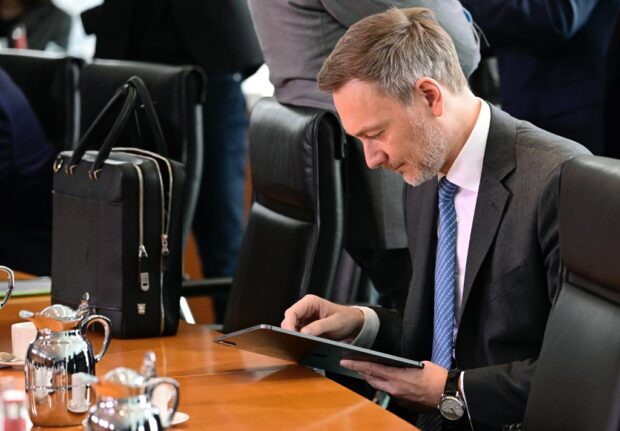

German Finance Minister Christian Lindner looks at a tablet device as he attends the weekly cabinet meeting at the Chancellery in Berlin, Germany on March 20, 2024. (Photo by Tobias SCHWARZ / AFP)
Luxembourg, Luxembourg — Germany’s finance minister on Thursday stood firm against new common EU borrowing amid calls for the bloc to club together as it did after the Covid pandemic to fund a defense overhaul.
Faced with Russia’s war on Ukraine, there have been growing calls for the 27-nation EU to pool its economic might to help revamp its defence industries.
Proponents such as France and the Baltic States insist a program similar to the historic 800-billion-euro post-Covid recovery plan could be needed to prepare Europe for the threat from Moscow.
READ: German economy buffeted by ‘perfect storm’
But Germany’s Christian Lindner, from the economically liberal Free Democratic Party, reiterated his opposition to any new joint borrowing scheme ahead of a summit of EU leaders next week.
“What we don’t need is a new common European debt,” he told journalists at a meeting with EU counterparts in Luxembourg.
Germany’s resistance to a repeat of anything resembling the Covid recovery scheme, which expires in 2026, is also supported by other so-called “frugal” EU countries such as the Netherlands, Austria an Sweden.
Lindner said the solution to ensuring funding needs lay in better mobilising private capital in the bloc, advocating for progress on long-stalled push for an EU “capital markets union”.
Lindner’s comments came after the EU’s foreign policy chief Josep Borrell said the bloc needed to revisit the idea of common debt as he warned that a wider war in Europe was “no longer fantasy”.
“The pandemic was an existential threat and we managed to go around the treaties in order to have the possibility of doing something that was theoretically forbidden: go to the financial markets and ask for money,” Borrell said in a speech on Tuesday.
“Is defence an existential threat today? Is the support to Ukrainian existential? If it is, then we should think wide. We should think deeper as we have done in the past.”






